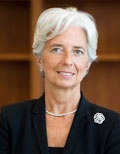
Corporations are making sizable profits, but IMF Chief warns that global economic economic growth is too slow. US corporations saw an 8.3% increase in the Second Quarter of 2011 while US GDP rose by only 1% (too close to stagnation) in the same period on an annualized basis. Employment and incomes have regressed or stalled out. The later data evidences a dangerous slowdown: many compare the economy to a bicycle – moving too slow it falls over. The former date evidencing growing disparity between corporate profits and overall economic recovery is indicative of the unequal benefits of America’s current economic performance. Wealth concentration in the pocketbooks of America’s richest elite is already at levels not witnessed for generations.
Obama Economics Ineffective? – “Trickle Down Economics” Even Less Successful:
The risks are political and social disruptions, especially as one wing of the US political establishment presses for more austerity and severe cut backs in social/welfare programs while rejecting any tax increases upon both the wealthiest and corporations. The promise of “trickle down” economics (by which the growing wealth of the richest and corporations flows down toward the working classes and more vulnerable) does not show evidence of being particularly effective. The right in US politics blames President Obama claiming too much regulation, social program spending and uncertainty. However, to whatever extent welfare state economics and regulation may not be working well enough, antidotal and now empirical data is even less supportive of the effectiveness of “trickle down economics.” The Tea Party revolution may soon be followed by even greater upheaval and revolt, but this time by those who are just plain suffering.
Risk of More Xenophobia & International Conflicts:
On a global level, this trend is also risky, perhaps dangerous to international peace and security. While one half of the globe is experiencing unprecedented economic gains, many societies in the Western Hemisphere are witnessing shrinking employment, incomes and savings accounts. Further, austerity is tearing away the welfare social net that has embodied the political/social contract for the last several generations, particularly in Europe. Ironically, at the same time many of the globe’s poorest still surge toward the borders of core Europe and the US/Canada. The danger is not only even more xenophobia within the old bulwarks of western democracies. New global conflicts may be both a distraction and effort to grab back losing political, military as well as economic influence. The greatest risk could be though competition for ever more desired natural resources, even in the face of an economic slowdown globally or regionally.
As long as economic expansion is moving forward globally, the benefits will impress greater stability and peace. Growing disparity is a greater risk. The greatest is a global economic slowdown as the pie shrinks for all.
“International Financial Crisis” Channel -
diplomaticallyincorrect.org/c/international-financial-crisis
By Ambassador Muhamed Sacirbey
Facebook – Become a Fan at “Diplomatically Incorrect”
Twitter – Follow us at DiplomaticallyX
Highlight of IMF Chief Christine Lagarde’s Comments:
“The fundamental problem is that in these advanced economies, weak growth and weak balance sheets—of governments, financial institutions, and households—are feeding negatively on each other. If growth continues to lose momentum, balance sheet problems will worsen, fiscal sustainability will be threatened, and policy instruments will lose their ability to sustain the recovery.”

